A boiler leaking from the bottom is worrying because it’s not a simple pipe or joint leak that can be checked by you. In most cases, a qualified engineer will need to open up the boiler casing and check inside. But there are some things you can check when you notice water dripping underneath and can take action to stop water damage.
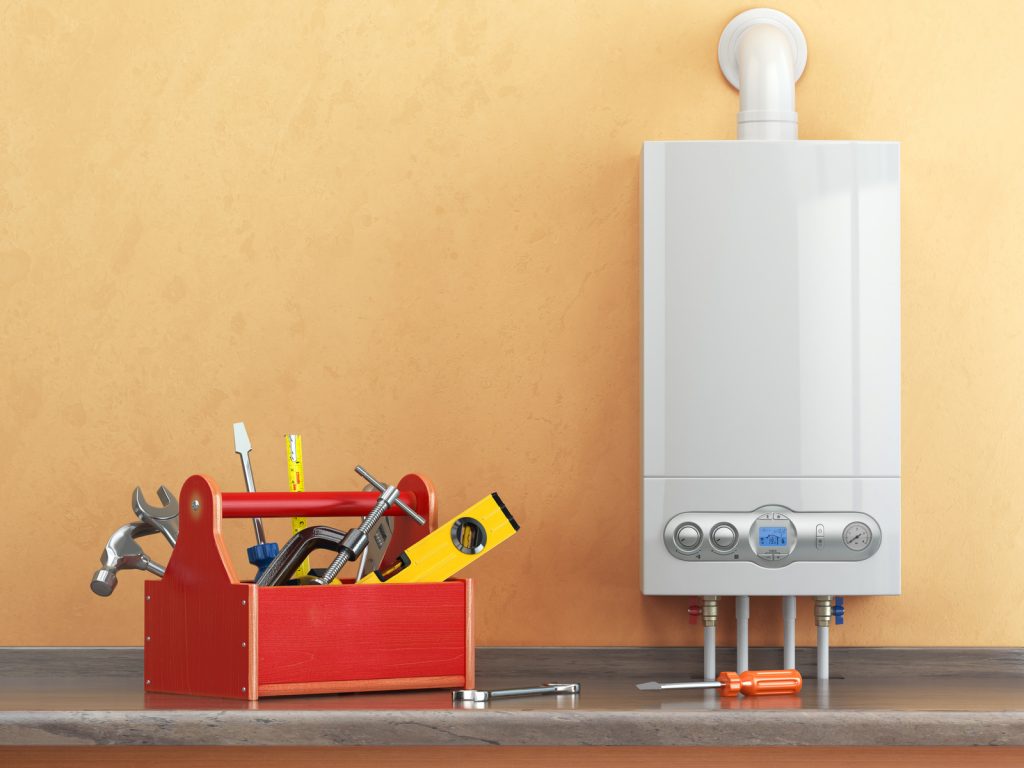
How to quick fix a leaking boiler?
By trying this fix first, you might get lucky and manage to stop the pinhole or small leak in the system. It is an inexpensive way to see if it does the trick before you are forced to spend hundreds on broken parts in the boiler.
You can use Sentinel leak sealer or this Fernox brand leak sealer which are both highly rated. They can be used to stop minor leaks anywhere on the heating system including radiators.
If you’re tired of sinking cash into your old boiler, a new boiler replacement is an option. Warmzilla is an online boiler installation company that is able to offer installation prices lower than most. You can get a fixed price online in minutes. Click the banner below:
Boiler Leaking from the Bottom Causes
Leaking pipework or joint connected to the boiler
Here the pipework is not soldered or installed properly. Maybe one of the fibre washers isn’t seated right. This is a common cause of a leaking boiler from underneath, especially on older boilers. It is easy to check and fix yourself in most cases too.
To check, look at each of the pipes and joints that connect to the bottom of the boiler. You will notice water marks or small drips running down a pipe joint and dripping off. If it is a connection on a fairly new boiler installation, it may just need the nut tightening up.
If you have tightened up the compression nut and it still leaks, it is likely to be a worn fibre washer that needs to be replaced. This is usually the case on old boilers. In this case, you will need to drain the heating system of water and replace the washer. If you are not confident in doing this yourself, call a repairman.
Boiler Leaking When It Rains
If the flue pipe isn’t fitted properly on the outside or sealed properly inside where it connects to the boiler, you will notice leaking water from the bottom of the boiler. Or you may hear dripping sounds coming from inside the unit when it rains.
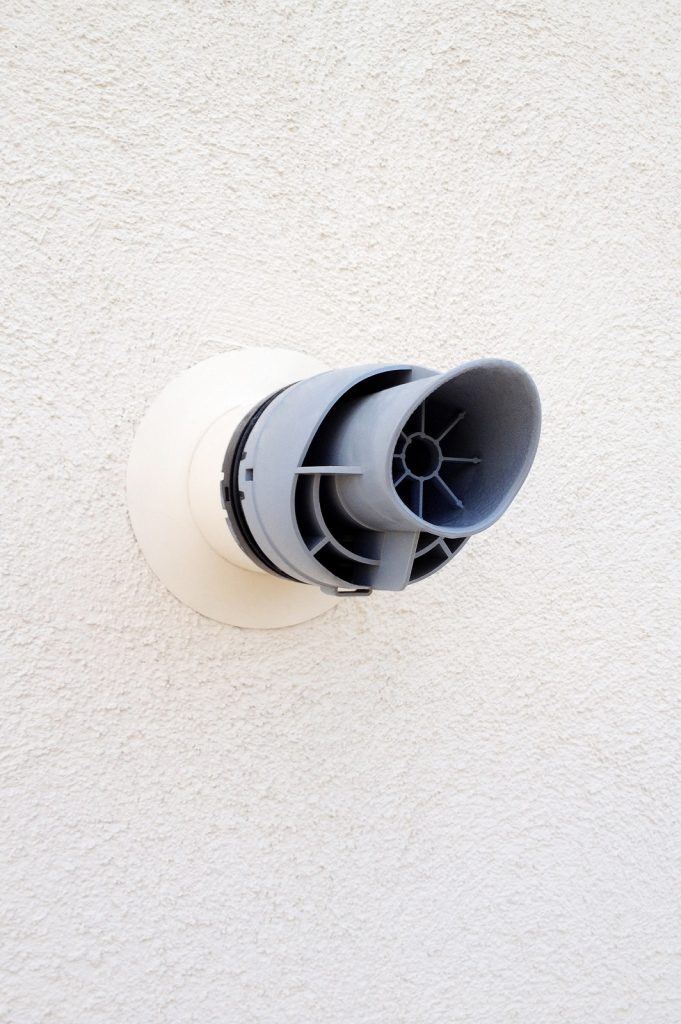
Sometimes the termination outside hasn’t sealed properly to prevent weather from entering. This is also dangerous because it could allow combustion products entry into the property. Or a weather collar that isn’t fitted or has perished could let water into the flue.
If you notice gaps or cracks on the outside where the pipe connects to the wall, call an engineer to repair it. Be careful not to pull the pipe back and forth as it could disconnect from the boiler unit inside. The pipe may not be secure enough to prevent it from detaching.
Boiler Filling Loop Leaking
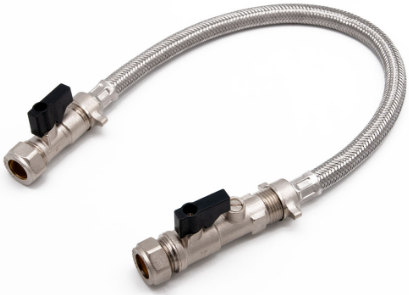
The filling loop helps repressurise a sealed heating system by introducing mains water into it.
A filling loop can spring leaks either from the isolation valve, nut connection or the flexible hose that gets damaged. A leak here is easily spotted being directly underneath the boiler.
The issue you have is once they start leaking, they tend to continue even with the valves closed. Over time you will lose pressure in the system and will have to use the filling loop to refill. It’s best to get this replaced at the first sign of a leak.
Pressure Relief Valve (PRV) Failing
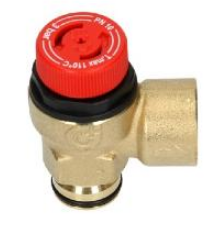
A common cause of leaking boilers is the PRV that isn’t closing properly due to dirt and residue on it. The PRV removes water if there is a high pressure build up in the system. But it can open up because of debris stuck inside and there appear tiny gaps that allow water to seep through. Or the rubber washer can become worn and let water leak.
Although you are most likely to see the effects of a faulty PRV on the copper pipe outside of the house, it can also leak water inside the boiler and drip underneath. Call an engineer to open up the boiler and see if the PRV can simply be cleaned and refitted or needs to be replaced.
Cracked Heat Exchanger
Limescale buildup in any part of the system can be a nuisance, but in the heat exchanger, it can be expensive too. The hotspots created by limescale can eventually lead to cracks on a heat exchanger. This can cause the component to leak. If this is the case, you’ll notice the boiler leaking from the bottom of the casing.
Not a very common occurrence, a cracked heat exchanger can be an expensive part to replace. So much that you may decide to invest the money in a boiler replacement. If the boiler is in warranty, contact the manufacturer. If out of warranty, have a serious look at new boilers.
A good engineer will investigate thoroughly if the issue is indeed a corroded heat exchanger or any of the other things that cause the boiler to leak.
If you’re looking for peace of mind that one call can take care of the home essentials, Hometree has great service at an affordable price.
Hometree offers customers peace of mind with home care packages for their boiler, central heating, plumbing, drains, and home electrics all at an affordable monthly or annual cost. Hometree’s aim is to take the stress out of boiler servicing and home maintenance with unlimited call-outs and a 24/7 helpline, as well as a no price-hike promise.
Click the banner below to find out more
Expansion vessel diaphragm has degraded
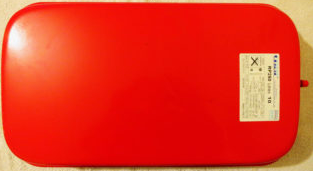
Expansion vessels usually come inside the boiler although some can be external. If the vessel body or diaphragm inside has degraded, it will let water leak out that will run down to the bottom of the boiler.
Water can collect inside the casing until it overflows out the bottom of the boiler. The danger is if water finds its way into the printed circuit board (PCB) and short circuits the electrics. In that case, you are looking at an expensive replacement. This is why it is so important to get any leaking boiler problems fixed as soon as its noticed.
Central heating pump leaks
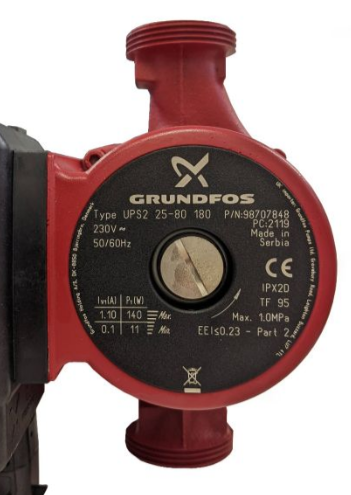
Heating pumps force water around the system to provide the required temperature at the radiators. Because so much water goes through them, they are common places for leaks.
If the pump hasn’t been securely fitted and has come loose, it can cause gaskets and seals to deteriorate and leak water through. The seals can wear down and perish anyway, so you will notice more leaks with the boiler over time.
Also, pumps have magnets in them and if the system water hasn’t been treated with inhibitor, the magnetite particles get attracted to the magnet causing buildup here. This can eventually lead to water seeping through.
Avoid Expensive Boiler Breakdown Costs
*The information in this article should be used for general guidance only and not as financial or health advice. Full details are on the link in the footer to our disclaimer page. Always discuss your requirements with a competent and suitably qualified professional before undertaking any work.
Affiliate disclosure
Heatology.co are participants in a variety of affiliate schemes which help fund and run this website, visitors who follow our links and purchase a product may earn Heatology.co a commission. The money we make from affiliate marketing costs you nothing but keeps us online, so thank you for your continued support!
